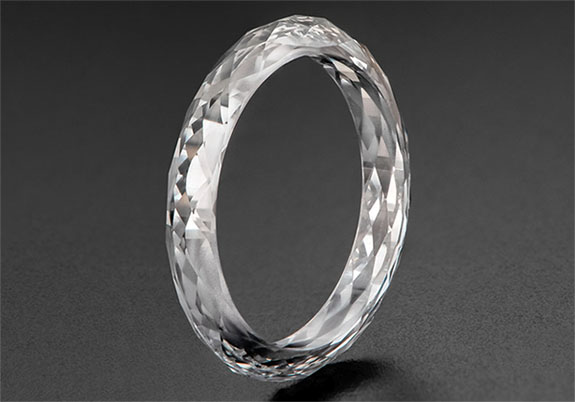GIA Evaluates 4.04-Carat Ring Carved From a Single-Crystal Lab-Grown Diamond
A little over four years ago, Dutch Diamond Technologies introduced the world to an all-diamond ring faceted from a plate of lab-grown material. Dubbed “Project D” and timed to coincide with the company's 10th anniversary, the high-profile accomplishment provided a publicity bonanza, while highlighting the high-tech company's innovative capabilities. The finished product boasted 133 facets and a total weight of 3.86 carats.

Now the company has created another fascinating all-diamond ring featuring an updated design and a carat weight of 4.04 carats. This ring, too, is fashioned from a single-crystal lab-grown diamond.
The Gemological Institute of America (GIA), the leading institute for research into diamonds, colored stones and pearls, announced last week that Dutch Diamond Technologies had submitted the newest ring to its New York laboratory for assessment. GIA's complete report will appear in the Fall edition of Gems & Gemology (G&G), its quarterly professional journal.
According to GIA, the ring, produced by Dutch Diamond Technologies (DDT) in collaboration with Belgian jewelry store Heursel, demonstrates the fusion between cutting-edge technology and traditional craftsmanship.
The ring was fashioned from an 8.54-carat laboratory-grown diamond plate created by chemical vapor deposition (CVD), according to DDT.
The lab noted that the manufacture of a solid single-crystal diamond ring is a very complex and challenging process. Once material is removed from the crystal, very fine fractures and imbalanced strain can have severe consequences and the ring can shatter.
The GIA added that the ring's creation involved 1,131 hours of processing (including pre-grinding) in the Dutch town of Cuijk, followed by 751 hours of polishing in Belgium. Overall, the project took more than six months to complete.
DDT employed lasers to cut a near-perfect circular ring and utilized digital imaging analysis to measure its inner and outer circumferences.
The 3.03 mm thick band has an inner diameter of 16.35–16.40 mm and an outer diameter of 20.32–20.40 mm. The band of the earlier design was slightly thicker (3.06 mm), but had a diameter that was smaller by about 1.5 mm.
“Although this is not the first 'ring' of this type that has been reported," said Tom Moses, executive vice president and chief laboratory and research officer at GIA, "it is the first time GIA has evaluated a ring carved from a single laboratory-grown diamond. As technology continues to evolve with man-made diamond growth, we expect to see more creative ways for this product to be used. New achievements will advance the bounds of what is possible with laboratory-grown diamond, both in new applications in jewelry and technology.”
More than 10 years ago, Shawish Geneva fashioned a ring from a single mined diamond. Shawish unveiled the innovative ring to the public during the 2012 Baselworld Watch and Jewelry Show. That ring was laser-cut from a 150-carat rough diamond.
Credit: Photo by Towfiq Ahmed, courtesy of GIA.

Now the company has created another fascinating all-diamond ring featuring an updated design and a carat weight of 4.04 carats. This ring, too, is fashioned from a single-crystal lab-grown diamond.
The Gemological Institute of America (GIA), the leading institute for research into diamonds, colored stones and pearls, announced last week that Dutch Diamond Technologies had submitted the newest ring to its New York laboratory for assessment. GIA's complete report will appear in the Fall edition of Gems & Gemology (G&G), its quarterly professional journal.
According to GIA, the ring, produced by Dutch Diamond Technologies (DDT) in collaboration with Belgian jewelry store Heursel, demonstrates the fusion between cutting-edge technology and traditional craftsmanship.
The ring was fashioned from an 8.54-carat laboratory-grown diamond plate created by chemical vapor deposition (CVD), according to DDT.
The lab noted that the manufacture of a solid single-crystal diamond ring is a very complex and challenging process. Once material is removed from the crystal, very fine fractures and imbalanced strain can have severe consequences and the ring can shatter.
The GIA added that the ring's creation involved 1,131 hours of processing (including pre-grinding) in the Dutch town of Cuijk, followed by 751 hours of polishing in Belgium. Overall, the project took more than six months to complete.
DDT employed lasers to cut a near-perfect circular ring and utilized digital imaging analysis to measure its inner and outer circumferences.
The 3.03 mm thick band has an inner diameter of 16.35–16.40 mm and an outer diameter of 20.32–20.40 mm. The band of the earlier design was slightly thicker (3.06 mm), but had a diameter that was smaller by about 1.5 mm.
“Although this is not the first 'ring' of this type that has been reported," said Tom Moses, executive vice president and chief laboratory and research officer at GIA, "it is the first time GIA has evaluated a ring carved from a single laboratory-grown diamond. As technology continues to evolve with man-made diamond growth, we expect to see more creative ways for this product to be used. New achievements will advance the bounds of what is possible with laboratory-grown diamond, both in new applications in jewelry and technology.”
More than 10 years ago, Shawish Geneva fashioned a ring from a single mined diamond. Shawish unveiled the innovative ring to the public during the 2012 Baselworld Watch and Jewelry Show. That ring was laser-cut from a 150-carat rough diamond.
Credit: Photo by Towfiq Ahmed, courtesy of GIA.

